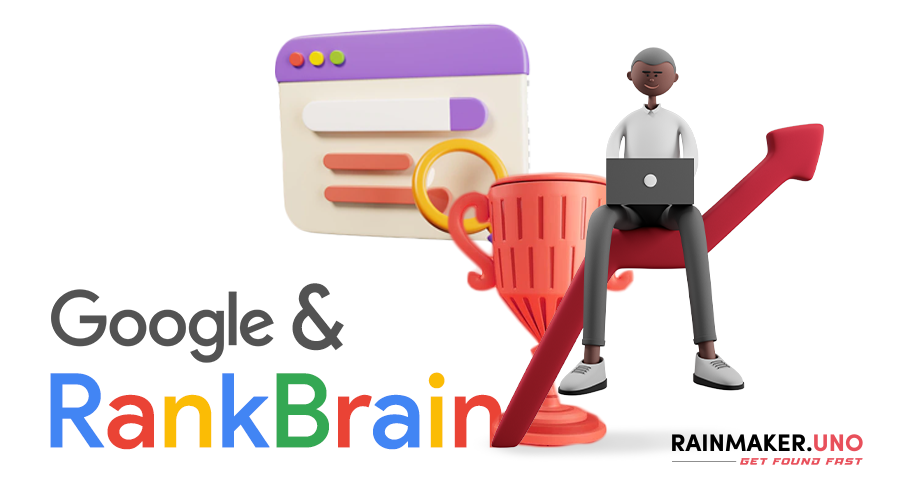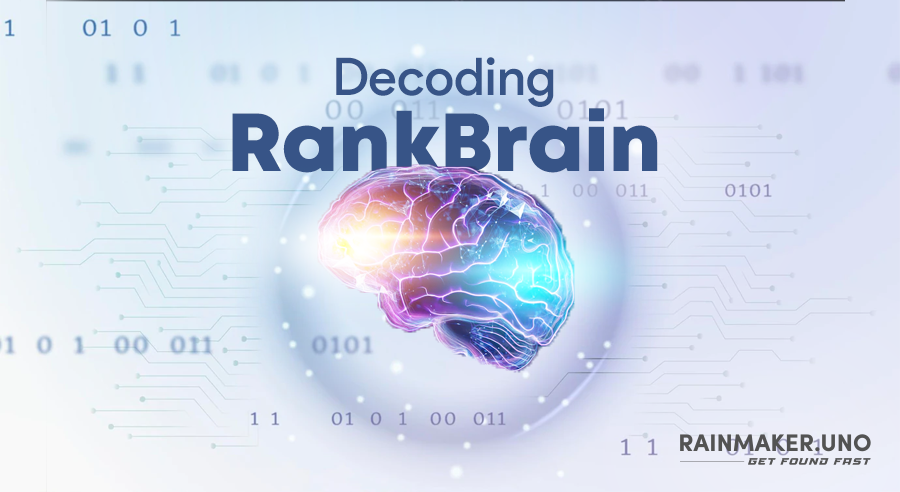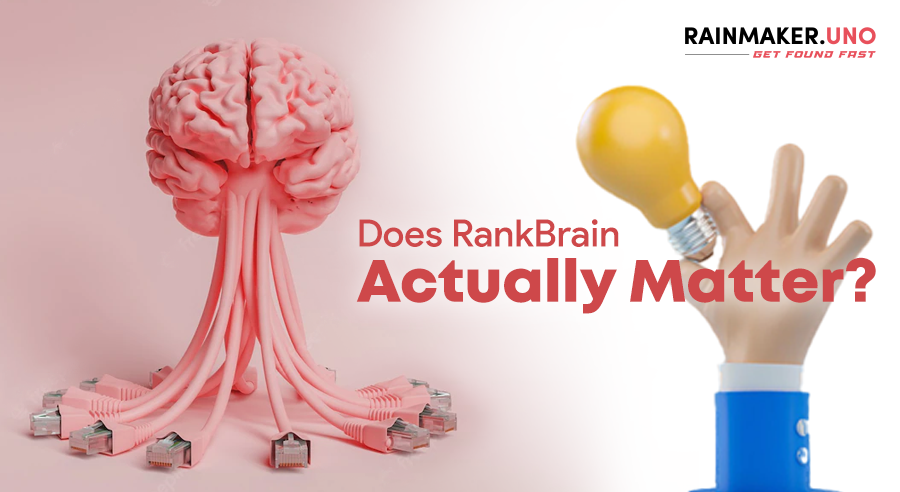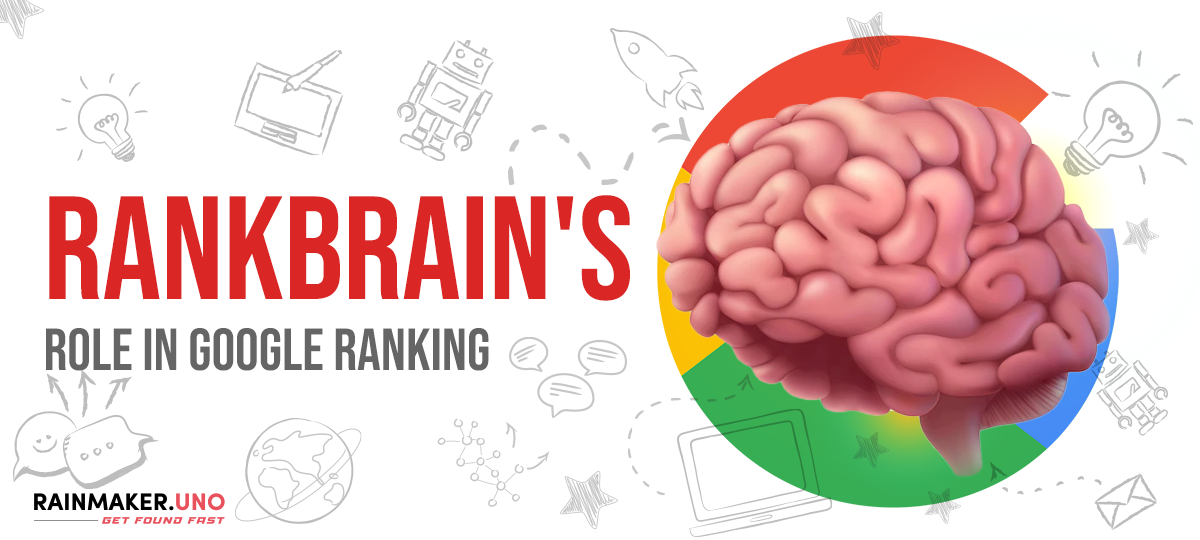RankBrain is a technology that impacts how Google returns more, albeit relevant, pre-screened search results based on the user intent of a search query. Its impact was so much so that TheNewBoston (a popular SEO channel) named it “the third most important ranking factor.”
Simply put, RankBrain has a sole purpose – understanding queries!

Google and RankBrain
Google first announced RankBrain to the public at Google’s annual conference for search specialists (SES) in 2015. It was initially meant to automatically improve search results for Google users, especially for previously unencountered queries, which still constitute 15% of Google searches. Between 2015 and 2016, an unannounced update to RankBrain integrated it into all queries. RankBrain slowly started working as a ranking factor and has since revolutionized search results.
Google’s core objective in creating RankBrain – make Google a better place for its users!

Decoding RankBrain
RankBrain is based on artificial intelligence and marked the first time introducing machine learning into search.
RankBrain uses two parameters to rank pages.
1. Understanding Keywords
2. Measuring User Satisfaction
RankBrain uses UX signals such as organic click-through rates (CTR), dwell time, bounce rates, and Pogo-sticking to determine if they satisfy true user intent. The pages are then listed based on this parameter. The more the people like a page, the better ranking it gets. The only means to ensure this is to maintain detailed, quality content that answers all the questions the user may or may not ask. The moment the performance drops, the page goes down in rank.
We can confidently tell you one thing, though. RankBrain is Google’s yet another attempt to curb spam, loopholes, and black hat tactics that are rampant on the web.
Google’s haziness in revealing details on RankBrain has sparked many a discussion. However, this isn’t the only topic debated in SEO forums. The subject of whether it’s a ranking factor is still being examined. Let’s see what we know so far about RankBrain as a ranking factor and how it affects search results in the following segments.
RankBrain at Work
Google’s search landscape is in constant flux, with new updates, algorithms, and ranking factors seemingly hitting the web daily. But nothing much has been revealed to the world by Google on how RankBrain actually works. Since the competition to rank better has gotten stronger, getting featured on page 1 alone does not suffice for eCommerce businesses. They are all vying for the top 3 spots.
But we know that RankBrain is different from other Google algorithms in that it is adept at answering ambiguous or confusing queries. It works with data assimilated from user interactions with search results, not web pages. RankBrain works on predictive guesses in unknown scenarios based on historical data and somehow makes it work where traditional algorithms miserably fail!

Does RankBrain Actually Matter?
We dug into how RankBrain works and how it’s said to affect Google’s ranking factors. Some have said that it impacts Google’s ranking. Many SEOs, meanwhile, are saying, “Blah blah blah.” But results show that RankBrain has an impact based on ambiguous queries and long-tail keywords.
We have noticed the following trends related to RankBrain over the past:
- Most of the instances where we see a question mark on our SEO clients’ websites are patterns that Google already demonstrates it understands well
- The vast majority of questions seem to be related to entities, not long-tail keywords
- Non-entities also seem to cause concerns
- Natural language queries are handled better
- The way Google handles synonyms is occasionally surprising
RankBrain and SEO – Optimizing for RankBrain
Experts say there is no hard and fast rule to optimize RankBrain. You optimize your content quality for user intent and automatically optimize for RankBrain. Keep function as the key factor while tailoring the content. Use tools like Google Natural Language API Demo, Google Knowledge Graph API, and Knowledge Graph Explorer to aid you with the development process. It would help you perceive how Google views your site and content and considers entities and high-ranking sites for prominent queries.
To paraphrase, to optimize for RankBrain, understand how Google intercepts user intent and entities. Following these tips will help you through the process.
- Use NLP API to review entities
- Gain in-depth understanding of Knowledge Graph Explorer entity
- Use the above information in your context – e.g., device or location
- Use tools like Mobile Moxie to run tests and compare results
- Optimize content and intent for RankBrain
- Focus on organic growth and not paid clicks
- Optimize UX signals to determine user satisfaction
- Avoid the obsolete long-tailed keywords
- Focus on medium-tailed keywords
- Write complete information that answers more questions
- Aim for questions that users never asked before
- Publish authoritative information on topics
Is RankBrain a Ranking Factor? - Rainmaker's Verdict
Oh yes! It is!
Based on educated guesses, we do believe that RankBrain is involved in all queries AND helps Google rank results. Google has confirmed the fact, and who are we to dispute that! And it works mainly for ambiguous keywords and queries that have never been keyed into a Google window. It works as a pre-conditioned filter than a signal. Its impact and importance in search have grown since its launch in 2015, and we feel it will only expand with time.
In Conclusion
Google Search Quality Senior Strategist at Google, Andrey Lipattsev, mentioned that RankBrain is one of the three most important ranking signals next to content and links. It has a significant impact on search results today. However, there is currently no ideal way to optimize the program other than providing exhaustive information about your query in the search window to optimize results.
Optimize your content for user intent, and RankBrain will naturally pick it up!
